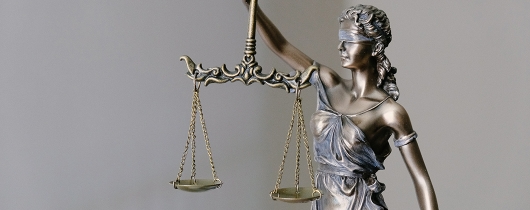The Law | La Ley

St. Ephrem, Deacon
2 Corinthians 3:4-11; Matthew 5:17-19
The 18th century English philosopher John Locke wrote: “The end of law is not to abolish or restrain, but to preserve and enlarge freedom. For in all the states of created beings capable of law, where there is no law, there is no freedom.”
Too often we tend to look on the law in negative terms because we misunderstand or limit the meaning of freedom. We speak about the law solely in personal or individual terms and neglect to consider how it orders our social relationships. We confuse freedom with license. We forget that freedom and the law not only guarantee rights but also impose responsibilities.
Jesus had a profound respect for the law, including and especially the Torah. At the same time, he never forgot that the purpose of that law was to help the people of Israel live in right relationship with God and others. When the law and its application became an obstacle to that purpose, he objected. He spoke out when the letter of the law smothered its spirit and burdened rather than liberated people.
St. Paul later shared in those criticisms, and in time he became convinced that the law had become a Sisyphean stone. It condemned its adherents to a life of futility, promising a righteousness and salvation they could never achieve. It was better, he insisted, to trust in God’s grace.
The law, religious or secular, is an instrument and not an idol. Its utility and its morality depend on how it is written, how it is used, and for what ends. We pray for the wisdom to make good laws, to use them to enhance human relationships, and to live in ways that glorify God and fulfill God’s will for us. - jc
----------------------------------------------------------------------------------------------------------
San Efrén, Diácono
2 Corintios 3:4-11; Mateo 5:17-19
El filósofo inglés del siglo XVIII John Locke escribió: "El fin de la ley no es abolir o restringir, sino preservar y ampliar la libertad. Porque en todos los estados de los seres creados con capacidad de ley, donde no hay ley, no hay libertad".
Con demasiada frecuencia tendemos a considerar la ley en términos negativos porque entendemos mal o limitamos el significado de la libertad. Hablamos de la ley únicamente en términos personales o individuales y dejamos de considerar cómo ordena nuestras relaciones sociales. Confundimos la libertad con la licencia. Olvidamos que la libertad y la ley no sólo garantizan derechos, sino que también imponen responsabilidades.
Jesús tenía un profundo respeto por la ley, incluida y especialmente la Torá. Al mismo tiempo, nunca olvidó que el propósito de esa ley era ayudar al pueblo de Israel a vivir en una relación correcta con Dios y con los demás. Cuando la ley y su aplicación se convirtieron en un obstáculo para ese propósito, se opuso. Se pronunció cuando la letra de la ley sofocaba su espíritu y agobiaba al pueblo en lugar de liberarlo.
San Pablo compartió más tarde esas críticas, y con el tiempo se convenció de que la ley se había convertido en una piedra de Sísifo. Condenaba a sus seguidores a una vida inútil, prometiendo una justicia y una salvación que nunca podrían alcanzar. Era mejor, insistía, confiar en la gracia de Dios.
La ley, religiosa o secular, es un instrumento y no un ídolo. Su utilidad y su moralidad dependen de cómo se escriba, cómo se utilice y con qué fines. Rezamos por la sabiduría para hacer buenas leyes, para usarlas para mejorar las relaciones humanas, y para vivir de manera que glorifiquen a Dios y cumplan la voluntad de Dios para nosotros. - jc




